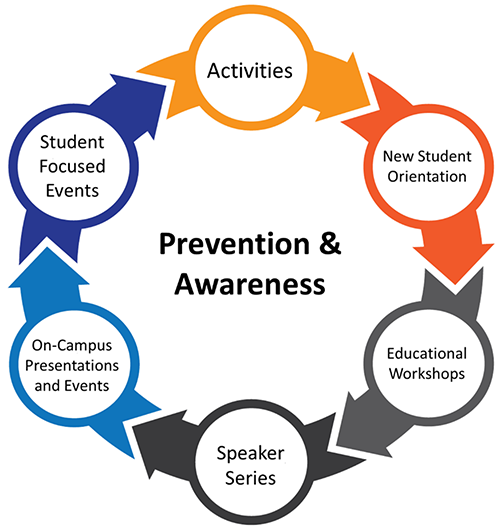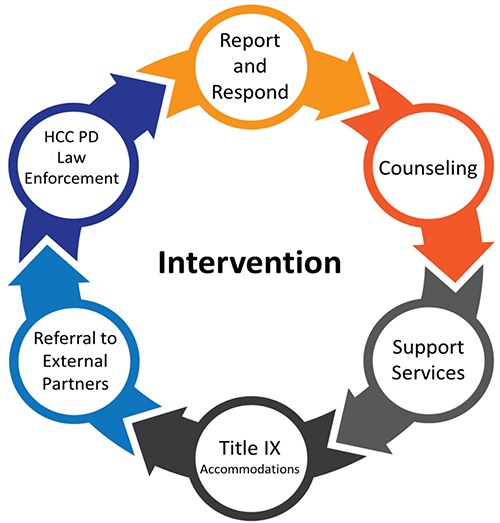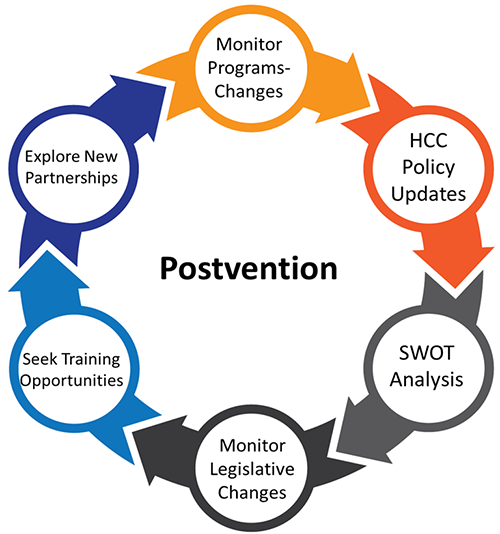Victim Empowerment Program
Purpose
The purpose of the Victim Empowerment Program (VEP) is to provide prevention, intervention, and postvention support and assistance to HCC students, faculty, and staff who have been victimized through threatened or actual sexual violence. It seeks to educate the college community and promote healthy relationships by promoting awareness activities, prevention and education events, and collaborating with internal stakeholders and community resources to promote the healing process of victims of sexual violence.
Program Goals
- Create a college community where anyone who is a victim of Intimate Partner Violence (IPV), or knows someone who is a victim of IPV, has access to education, support, and services.
- Increase awareness of IPV, sexual violence, and sexual assault among the College District Community
- Promote the primary prevention of Intimate Partner Violence (IPV)
Program Services
- Develop, implement, and promote awareness activities and events to prevent incidences of IPV
- Increase awareness of community partnerships, services, and resources to prevent IPV
- Promote preventative strategies to promote healthy relationships
- Educate the college district community on protective and risk factors to prevent IPV
Target Audience
- Students
- Faculty
- Staff
- Victims of IPV
- Survivors of IPV
- Marginalized groups
Methodology and Framework
The College District is already offering IPV supportive services to students, faculty, and staff in a variety of ways. The services however are individualized and not managed as an integrated whole within the College District. The VEP promotes the availability of these services and resources at a broader level, ensuring that anyone who is a victim of IPV or potential victim, has access to these resources to support them in their journey towards survivorship.
The following is the framework of the VEP. It reflects the integration and collaboration of multi-disciplinary teams and services aimed at addressing the diverse needs of victims of IPV effectively and efficiently throughout the College District.
The VEP is divided into the following three components:
Methodology and Framework
Prevention & Awareness

Improve the wellbeing of the campus community by:
- Providing education to students, faculty and staff regarding recognizing IPV and how to report incidents of IPV
- Proactively raise awareness about the prevalence of IPV, type of abuse, warning signs and symptoms of IPV, cycle of abuse, and how to help self and others if dealing with IPV
- Provide education on healthy-intimate relationships, consent, and self-agency
- Provide information on how and where to receive safety and support from HCC internal resources such as Counseling, Office of Equal Opportunity and Title IX, and HCC Police Department
- Provide information on how to access external/community resources
- Removing the stigma around IPV and encourage help-seeking attitudes among the campus community
- Examples of preventive measures include, but are not limited to, District and campus sponsored speaking events, workshops, presentations, webinars and other activities centered on IPV
Intervention

Through a collaborative partnership among counselors, the Office of Equal Opportunity and Title IX , HCC Police Department, external service providers, and others, the intervention strategy enables the College District to receive timely reports of offenses and intervene early in cycles of victimization. Furthermore, in addition to engaging with IPV victims and survivors, the IPV intervention strategy includes a parallel victim outreach structure whereby offenders are also provided services, safety planning, and information to help reduce further harm. This includes:
- Access to an online reporting system whereby anyone can file a report and request supportive services;
- Employee Assistance Program referrals for employees;
- Access to and referral to law enforcement for assistance, ensuring the safety of the individual reporter and the campus community
- Counseling supportive services for students to assess their emotional and psychological needs, need for medical care, housing, food, transportation, and mental health services;
- Students may be referred to external targeted agencies such as Aid to Victims of Domestic Abuse (AVDA), Houston Area Women’s Center (HAWC), Harris Center for Mental Health and IDD, and other community resources for trauma informed counseling;
- Providing Title IX supportive measures to students (Title IX academic accommodations) to include but not limited to individualized reasonable classroom accommodations, considerations for medical/compassionate withdrawals, request for an Incomplete;
Postvention

HCC recognizes that communities that are proactive in addressing incidents of IPV have greater success at preventing future incidents. For this reason, HCC included a postvention component as a prevention strategy to monitor and evaluate the effectiveness of the VEP. Postvention is a dynamic process that allows the institution to adapt and institute program changes based on prior learning of the effectiveness of the program. The changes would occur, in part, as a result to revisions in laws and regulations governing IPV, updates to existing institutional policies surrounding VEP, opportunity to enhance advocacy initiatives, the need to expand external resources, which would result in improving the overall program effectiveness to meet the ever changing and diverse needs of our students, faculty and staff.
Additional Information
Definitions
Intimate Partner Violence (IPV)
Intimate partner violence (IPV) is abuse or aggression that occurs in a romantic relationship and may include current and former spouses and dating partners. IPV can vary in how often it happens and how severe it is. It can range from one episode of violence that could have lasting impact to chronic and severe episodes over multiple years. IPV can include any of the following types of behavior:
- Physical violenceis when a person hurts or tries to hurt a partner by hitting, kicking, or using another type of physical force.
- Sexual violenceis forcing or attempting to force a partner to take part in a sex act, sexual touching, or a non-physical sexual event (e.g., sexting) when the partner does not or cannot consent.
- Stalking is a pattern of repeated, unwanted attention and contact by a partner that causes fear or concern for one’s own safety or the safety of someone close to the victim.
- Psychological aggressionis the use of verbal and non-verbal communication with the intent to harm another person mentally or emotionally and/or to exert control over another person.
Who is a victim?
A victim is any person who has suffered harm, including physical or mental harm; emotional suffering; economic loss or substantial impairment of his or her fundamental rights, through acts of IPV. A person may be considered a victim regardless of whether the perpetrator is:
- Identified
- Apprehended
- Prosecuted or convicted; and
- Regardless of the familial relationship between the perpetrator and the victim.
All victims, regardless of race, gender, sex, sexual orientation, gender identity, marital status, ethnic or social origin, color, age, disability, religion, immigration status, or national origin are included.
What is Victim Empowerment?
Victim empowerment is an approach to facilitating access to a range of support services for all people who have suffered harm, trauma, and loss through acts of IPV. It is the process of promoting the resourcefulness of victims of crime and violence by providing opportunities to access services available to them, as well as to use and build their own capacity and support networks and to act on their own choices . Hence, empowerment may be defined as having (or taking) control, having a say, being listened to, being recognized and respected as an individual and having the choices one makes respected by others (moving from victim to survivor).
Victim empowerment aims to restore the loss or damage caused by acts of IPV and their consequences through a variety of actions intended to empower the victim to deal with the consequences of the event, to leave it behind and minimize or diminish the suffering and loss due to the IPV event. It is premised upon the belief that individuals, families, and communities have the right to privacy, safety and human dignity, and that victims should play a more central role in their healing process.
Victim support is the empathic and person-centered assistance rendered to an individual following an incident of IPV. Through victim support aimed at victim empowerment, the victim is restored to a state as close as possible to that existing prior to the offense and ideally to a state where the person has been able to learn and grow.
It is important to recognize that victims do not all have the same degrees of need for empowerment and support - there is a diversity of needs. In order to enable the disempowered victim to recover from the exposure to IPV, such needs must be met through an integrated, multidisciplinary team approach. By empowering victims in a holistic manner, it reduces secondary victimization, encourages victims to remain active in their education, promotes cooperation with the criminal justice system if needed, reinforces socially desired behavior, and acts as a deterrent to offenders or potential offenders. Victim empowerment thus has the potential to prevent and reduce sexual violence.
Frequently Asked Questions regarding IPV
- How do I file a complaint regarding IPV?
Click here to file an electronic report, by email to hcc.oeotix@hccs.edu, or by telephone at 713.718.8271 - I am a student, how do I contact a counselor to receive supportive services?
Click here to contact a counselor. - I am an employee, how do I contact the Employee Assistance Program (EAP) to receive supportive services?
The EAP may be contacted at 1.888.327.0004 or visit https://guidanceresources.com (Register > Organization Web ID: HCC)
Office of Equal Opportunity and Title IX (EO/TIX)
Consultations or Questions:
